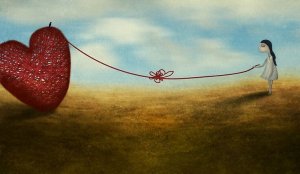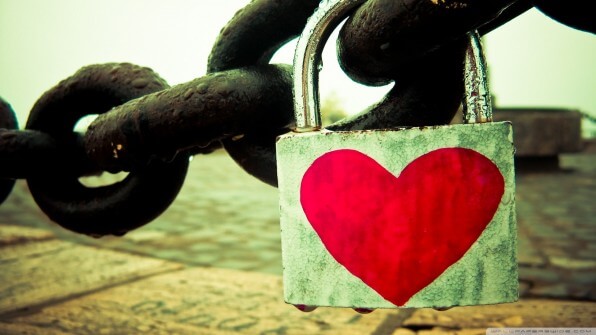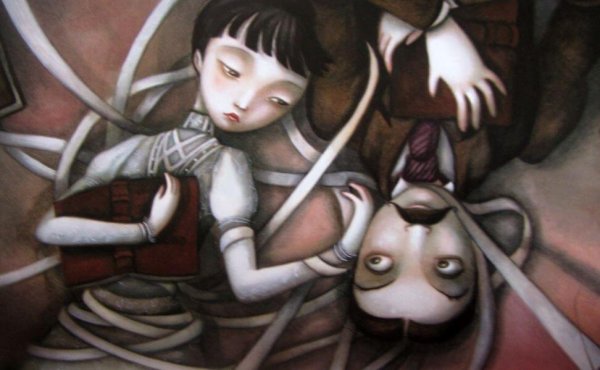When Love Becomes Dependence

The word “dependence” refers to certain conditions, limitations, or restrictions imposed on us by our environment. For example, to be alive, we depend on eating, drinking, sleeping, breathing, etc.
In this sense, we’re talking about absolute needs, without which nobody would be able to survive. It’s completely reasonable and beneficial to recognize that you need and depend on certain things to be alive.
On the other hand, we have relative needs that we don’t depend on, because they’re just preferences that make life a little better. Without them, we could still continue with life normally.
For example, if I want to drive a nail into the wall, it would be foolish to say that I absolutely need a hammer, since I could use another instrument, like a heavy rock, for example. The hammer is a relative need, although preferable to the stone because it’s more comfortable, of course.
Once this difference is understood, it can easily be applied to the realm of psychology, and love in particular. We erroneously believe that we need love in order to be happy or survive, but although studies have been done on the subject, none of them have been able to conclude that the participants’ happiness, or a lack thereof, was due to whether or not they had love in their lives.

If you think that you need love in your life, and even more so, the love of someone in particular, you’ll end up becoming dependent on that person, as if your life couldn’t follow it’s normal path if they weren’t with you. Dependence puts you in chains.
You need that person like you need water to hydrate and survive, although that need is simply invented by your mind.
How can you tell if it’s love or dependence?
There are certain clues that can help you realize that you’re falling into the jaws of emotional dependence:
You let the other person treat you badly
You’ve idealized the other person so much that you think that in love, and with this person in particular, “everything is worth it,” that it doesn’t matter if they ever disrespect you, that they’ll change, etc. Deep down, you know that this will never happen, and that you’re suffering but you’re terribly afraid of standing up to them or leaving the relationship. You prefer to bear the unbearable.
You get anxious when the other person isn’t around
Because you see them as a need, you get afraid that they won’t be constantly by your side, since that would mean you might lose them, or that you can’t control where they are and what they’re doing. It’s like not finding water to drink and dying of thirst; you get equally as anxious, but the difference is that water is a real need.
You feel like life has no meaning without them
You dread the thought of a future without that person. You think that without them, you couldn’t be happy, you wouldn’t be able to enjoy anything, you’d be alone forever, etc. All of these extremely unrealistic thoughts are a product of the belief that you need love to function. But dependence is not the answer.

You’ve stopped being yourself since the relationship began
You no longer do activities or plan things that you used to be passionate about, and you’ve even stopped seeing your friends as much. Now, you prefer to do the things your partner likes to do, and you’ve even immersed yourself into things that you never thought would interest you. In short, you’re not the authentic person you were before. Rather, you’ve become attached at the hip with your partner, and deep down, this makes you feel empty.
Some strategies to stop being so dependent
If you’ve identified with any of the above and want to leave the jail that you’ve put yourself in, you have to confront your fear of being alone. Realize that the key to ending this dependence is already in your pocket; you just have to use it!
- Modify your hyper-romantic thoughts. Romanticism is beautiful and fun in normal doses, as long as you can control it. But if it gets out of hand, you might start thinking false ideas like “without you, I’m not worth anything,” “without you I would die,” “your absence pains me,” etc. These ideas, ingrained by our culture, do nothing but fill you with anxiety over the the constant threat of loss.
- You are not your partner’s property, and they are not your property. Even though we say things like “my boyfriend,” “my partner,” “my husband,” that “my” is just a communicative tool. In reality, that person is free, they don’t belong to you. They’ve come into your life because they wanted to, and they can leave whenever they want, whether you like it or not. Therefore, you should start to detach yourself and understand that although they’re your partner right now and you share your lives in a certain way, one day they might be just another person in the world and you’ll survive without them.

- Revise your beliefs. Why do you need that person’s love? What do you do with that love? Why do you want it? Does it provide you with satisfaction and happiness, or does it go beyond that? Where is it written that you need a partner to be happy?
- Change your behavior. Once you’ve worked on those unrealistic thoughts and beliefs, it’s necessary to put them into practice in your behaviors. Stop checking or confirming where your partner is, and stop giving them unnecessary explanations.
Enjoy their company, but also your own company, both with other people and alone. Do what you like to do and not what you should do because you have a partner. If your partner accepts your new changes, that’s wonderful. If not, run away! That person is not worthy of you, and you don’t need them. You don’t have to depend on someone else to be happy.
I Can Live Without You: The Importance of Emotional Independence
The word “dependence” refers to certain conditions, limitations, or restrictions imposed on us by our environment. For example, to be alive, we depend on eating, drinking, sleeping, breathing, etc.
In this sense, we’re talking about absolute needs, without which nobody would be able to survive. It’s completely reasonable and beneficial to recognize that you need and depend on certain things to be alive.
On the other hand, we have relative needs that we don’t depend on, because they’re just preferences that make life a little better. Without them, we could still continue with life normally.
For example, if I want to drive a nail into the wall, it would be foolish to say that I absolutely need a hammer, since I could use another instrument, like a heavy rock, for example. The hammer is a relative need, although preferable to the stone because it’s more comfortable, of course.
Once this difference is understood, it can easily be applied to the realm of psychology, and love in particular. We erroneously believe that we need love in order to be happy or survive, but although studies have been done on the subject, none of them have been able to conclude that the participants’ happiness, or a lack thereof, was due to whether or not they had love in their lives.

If you think that you need love in your life, and even more so, the love of someone in particular, you’ll end up becoming dependent on that person, as if your life couldn’t follow it’s normal path if they weren’t with you. Dependence puts you in chains.
You need that person like you need water to hydrate and survive, although that need is simply invented by your mind.
How can you tell if it’s love or dependence?
There are certain clues that can help you realize that you’re falling into the jaws of emotional dependence:
You let the other person treat you badly
You’ve idealized the other person so much that you think that in love, and with this person in particular, “everything is worth it,” that it doesn’t matter if they ever disrespect you, that they’ll change, etc. Deep down, you know that this will never happen, and that you’re suffering but you’re terribly afraid of standing up to them or leaving the relationship. You prefer to bear the unbearable.
You get anxious when the other person isn’t around
Because you see them as a need, you get afraid that they won’t be constantly by your side, since that would mean you might lose them, or that you can’t control where they are and what they’re doing. It’s like not finding water to drink and dying of thirst; you get equally as anxious, but the difference is that water is a real need.
You feel like life has no meaning without them
You dread the thought of a future without that person. You think that without them, you couldn’t be happy, you wouldn’t be able to enjoy anything, you’d be alone forever, etc. All of these extremely unrealistic thoughts are a product of the belief that you need love to function. But dependence is not the answer.

You’ve stopped being yourself since the relationship began
You no longer do activities or plan things that you used to be passionate about, and you’ve even stopped seeing your friends as much. Now, you prefer to do the things your partner likes to do, and you’ve even immersed yourself into things that you never thought would interest you. In short, you’re not the authentic person you were before. Rather, you’ve become attached at the hip with your partner, and deep down, this makes you feel empty.
Some strategies to stop being so dependent
If you’ve identified with any of the above and want to leave the jail that you’ve put yourself in, you have to confront your fear of being alone. Realize that the key to ending this dependence is already in your pocket; you just have to use it!
- Modify your hyper-romantic thoughts. Romanticism is beautiful and fun in normal doses, as long as you can control it. But if it gets out of hand, you might start thinking false ideas like “without you, I’m not worth anything,” “without you I would die,” “your absence pains me,” etc. These ideas, ingrained by our culture, do nothing but fill you with anxiety over the the constant threat of loss.
- You are not your partner’s property, and they are not your property. Even though we say things like “my boyfriend,” “my partner,” “my husband,” that “my” is just a communicative tool. In reality, that person is free, they don’t belong to you. They’ve come into your life because they wanted to, and they can leave whenever they want, whether you like it or not. Therefore, you should start to detach yourself and understand that although they’re your partner right now and you share your lives in a certain way, one day they might be just another person in the world and you’ll survive without them.

- Revise your beliefs. Why do you need that person’s love? What do you do with that love? Why do you want it? Does it provide you with satisfaction and happiness, or does it go beyond that? Where is it written that you need a partner to be happy?
- Change your behavior. Once you’ve worked on those unrealistic thoughts and beliefs, it’s necessary to put them into practice in your behaviors. Stop checking or confirming where your partner is, and stop giving them unnecessary explanations.
Enjoy their company, but also your own company, both with other people and alone. Do what you like to do and not what you should do because you have a partner. If your partner accepts your new changes, that’s wonderful. If not, run away! That person is not worthy of you, and you don’t need them. You don’t have to depend on someone else to be happy.
I Can Live Without You: The Importance of Emotional Independence
This text is provided for informational purposes only and does not replace consultation with a professional. If in doubt, consult your specialist.







